Deborah J. Ross's Blog, page 30
March 18, 2022
Short Book Reviews: A Queer Fantasy Role Playing Club Love Story
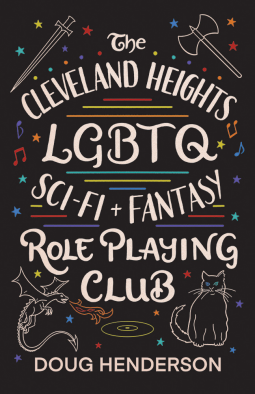
The Cleveland Heights LGBTQ Sci-Fi and Fantasy Role Playing Club, by Doug Henderson (University of Iowa Press)
To begin with a disclaimer: I’m not a gamer, although I appreciate both the imagination and the community-building involved. I found the idea of a queer (in the most inclusive meaning) D & D club appealing. I wondered how would this be any different from a mainstream (cis/het) club. The answer turned out to be both not so much and a lot.
The players at the Readmore Comix and Games store’s weekly game include both out and closeted gays, a transgender dungeon master, and a confused maybe-bisexual. The group has become too small for a great adventure, so when a new guy joins, sensitive, lonely Ben is instantly smitten. That is, until his character is killed in the game, the boyfriend of the closeted banker is accosted on the street, and the connections and parallels between the game and real life become even stronger. The game characters, situations, and humor reflect the changing worlds of the players.
Since I’m not a gamer, I didn’t connect with much of the game action. I kept thinking I’d never write a plot line like that, while I tried to keep in mind that games have a different story structure. What mattered to me were the reactions and interactions of the players. I suspect that the intended audience, queerfolk who are also gamers, would love the campy atmosphere and the burgeoning sexual tension between Ben and the new guy.
In the end, though, I found the resolution too pat, the problems too easily overcome, and too many questions left unanswered. But for all that, it’s a sweet gay-gamer-geeky love story sure to bring a smile to many readers’ faces.
March 14, 2022
Cross Training For Writers
 Cross-training is a concept I snagged from athletics. It's a way of improving fitness for one particular sport (or art) by practicing another. The idea is that the body adapts to repetitive exercises and, by becoming more efficient, shows slower progress.
Cross-training is a concept I snagged from athletics. It's a way of improving fitness for one particular sport (or art) by practicing another. The idea is that the body adapts to repetitive exercises and, by becoming more efficient, shows slower progress.Over the years, I've noticed that if I'm stuck on a story and can't figure out how to even think my way toward a solution, one of the most helpful things I can do is to listen to other storytellers talk about their work. In particular, I'd put on one of those bonus material discs from a favorite movie and listen to directors and screenplay writers discuss their approaches. (My favorites are Peter Jackson, Fran Walsh, and Philippa Boyens talking about how they adapted The Lord of the Rings into film, how they decided what to leave out, what to expand or re-arrange, that sort of thing; because I know the books so well, I can follow their interpretive process.) I come away re-charged because the story-telling is similar enough and yet different enough from what I do in prose. I've also gotten much good perspective from books on screenplay writing for much the same reason. I don't want to write a script for a movie or a play, but I do benefit from that particular way of looking at story, character, dialog, and action.
I find, though, that this strategy is more useful for "getting-unstuck" than for "general writerly health." I am a fiction writer -- I deal in prose, not script, not poetry (although I greatly admire people who can do them!) I'm struck by how many writers I know who have some other areas of creativity in their lives. Music springs immediately to mind, how many writers I know who also sing or play an instrument, many of them at quite a high level of proficiency. I suspect the same is true for painting, for knitting, for cooking . . .
I've been studying piano for about 12 years now. It's my first formal music training, although I sat through about a gazillion lessons with each of my two children (the rule was, you begin at 5 and keep studying as long as you live at home). Finally it was my turn. There's a special joy in being an adult student, already appreciating the importance of repetition, analysis, lyricism; being able to choose music I love, whether it's in the standard repertoire or not; being very clear that this is for my own pleasure. I'm currently in the midst of a love affair with the French Impressionists.
I don't know why I should have been surprised when music lessons started having an amazing effect on my writing. I conceptualized this that playing the piano and reading staff notation was forcing my brain to work in a different way, but I think it's more than that. As I learn a piece, I go on a journey inside the structure of the music. Music isn't just isolated notes, any more than writing is isolated letters. It's movement and interaction, harmony and dissonance, rising and falling tension. This is especially true for "narrative" music. (I have no idea if that's a technical term, but it's one that makes sense to me.) I get to immerse myself in a very different form of "story-ness," one completely without words, one that exists only in the moment and in my memory. Writing's like that -- the ideas and images are flashes of electricity and squirts of neurochemicals in my brain, evanescent -- and then I capture them. Well, I make an approximation of turning them into a form that endures over a somewhat longer time.
None of this translates directly into better writing. What it does is push my mind in different directions. It's like creativity yoga. The bonus is that besides "improved overall conditioning," I come away with new experiences as well, so expect music to play a greater role in my work as time goes on!
March 11, 2022
Short Book Reviews: Noir Gangsters in 1970s Mexico City
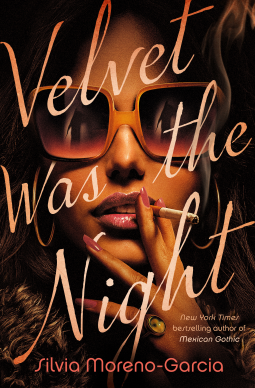 Velvet Was the Night, by Silvia Moreno-Garcia (Del Rey)
Velvet Was the Night, by Silvia Moreno-Garcia (Del Rey) The historical setting for Silvia Moreno-Garcia’s noir novel, Velvet Was the Night, is the violent suppression of a student uprising in Mexico City in the late 1960s, and that part was fascinating. The characters, an idealistic youth drawn into the world of gang brutality, and an insecure secretary, find themselves drawn into the mysterious disappearance of an art student who may be in possession of incriminating photographs related to the uprising. For most of the book, Maite and Elvis go about their separate lives, slowly spiraling toward one another.
I loved the novels of Silvia Morena-Garcia previously reviewed here (Gods of Jade and Shadow, The Beautiful Ones, Mexican Gothic, and Certain Dark Things). For me, however, this gritty novel never found its center, either dramatically or morally. I found both central characters ambivalent enough to be unsettling. I kept waiting for them to grow up, but they never did. Elvis becomes a casual murderer and torturer, without empathy for his victims even when he himself becomes one. Maite’s a thief, consumed with envy, living vicariously through the treasures she makes off with. Sure, they’re anti-heroes, but I like a little redemptive virtue and a reason to connect emotionally with my anti-heroes. The only characters I cared about were minor and didn’t stay around for the ending. The background, while intriguing, seemed to belong to a different story. Added to this, I’m profoundly uninterested in gangsters and their culture, and would not have picked up this book were it not for the author’s other, luminously creative works. I applaud her courage in tackling new subject material. All experiments run a risk, and the edgier the territory, the trickier the high-wire act. Other readers may gobble this one up but for me, even with Moreno-Garcia’s storytelling skill that kept me in the story until the end, the result was more “meh” than “magical!”
March 7, 2022
Guest Post: Jane Lindskold on Changing Your Mind
 Finches Consider Their Options
Finches Consider Their Options
It’s okay to change your mind about something you’re writing. That’s what I’ve recently done with a plotline of a novel I started late last summer, and recently returned to working on.
My life has changed a lot in many ways over the last six months. In large part due to these changes, a major plotline that seemed very compelling back when I started the piece in August of 2021 not only no longer held my attention, I was actively opposed to working on it. Since this did not apply to other plotlines in the same piece, which were developing easily and held my interest, I gave myself permission to let this plotline go.
Does this mean that prior effort was “wasted”? Not at all. The plotline may still come into the book at a later point. Or it may be the heart of a later book. Or it may simply have been a wrong turn.
I’ll know when I finish writing what I’m now happily working on.
One of the great freedoms to writing something on spec is that you don’t need to answer to anyone except your Muse when creating a story.
Sure, you can still change your mind, but there’s an extra step if you have sold or placed the piece based upon a proposal. It’s not right to drop, say, a twisted romance on an anthology to which you’ve promised a dark fantasy sword and sorcery adventure. Not only would the editor have every right to reject the new take, you’ll probably have seriously damaged any reputation you had for reliability or professionalism.
Nor, of course, if you’re writing in a series can you suddenly change established elements from prior published works. Firekeeper will never have been raised by giraffes, for example.
In fact, the longer the series, the more restrictions develop. Finding good stories that fit into the established material is simply one of the challenges of writing a series. If you can’t find a good story, take a breather from that series.
I’ve watched so many writers push and push to keep working on a story that has lost its “zing.” They seem to have forgotten that part of writing well is writing about something that has your full enthusiasm.
Or so I feel, at least. As always, I’m happy to hear arguments to the contrary or examples of where an author managed the reverse.
Meanwhile, I’ll go wander off and get back to writing. I can’t wait to find out what’s next.
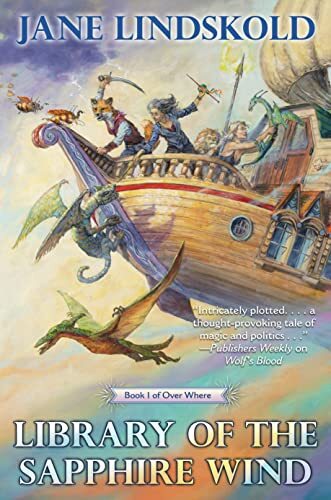
Jane Lindskold is the award-winning, New York Times best-selling author of more than twenty-five novels, including Library of the Sapphire Wind and Aurora Borealis Bridge, the six-volume Firekeeper Saga (aka “The Wolf Books”), the two athanor novels (Changer and Changer’s Daughter), the three volumes of the Breaking the Wall series, the Artemis Awakening series, and many more. Lindskold has also written in collaboration with David Weber (Fire Season and Treecat Wars) and Roger Zelazny (Donnerjack and Lord Demon). When she’s not writing or reading, she’s likely being ordered around by a variety of small animals. Lindskold lives in New Mexico.
I've been enoying Library of the Sapphire Wind -- women of "a certain age" (meaning gray-haired and juicy with wisdom) get to have adventures in a world of anthropomorphic races. Plus I love it when a librarian, an archaeologist, and an unrepentant hippy grandmother team up.
Here's the skinny: Instead of mentors, they got monsters . . . That’s what Xerak, Vereez, and Grunwold think when three strange creatures shimmer into being within the circle of Hettua Shrine. Their conclusion is reasonable enough. After all, they’ve never seen humans before.
As for Margaret Blake, Peg Gallegos, and Tessa Brown—more usually known as Meg, Peg, and Teg—they’re equally astonished but, oddly enough, better prepared. Age and experience have accustomed them to surprises. A widely varied course of reading material has intellectually prepared them for the idea that other worlds, even worlds where people with traits more commonly ascribed to “animals” may exist.
Then there is the mysterious verse that Teg speaks as they arrive, words that seem to indicate that the Shrine must have been at least partially responding to the request made of it.
Despite doubts on all sides, the three unlikely mentors join forces with the three young “inquisitors” and venture out into the world Peg dubs “Over Where.” First they must find the Library of the Sapphire Wind, destroyed years before.
Will they find answers there, or is this only the first stage in their search?
March 4, 2022
Short Book Reviews: Creating Alien Community
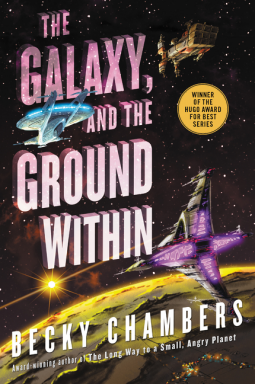
The Galaxy, and the Ground Within, by Becky Chambers (Harper Voyager)
Set on an uninhabitable planet whose only value is as a stopover for other worlds, this story explores what happens when members of very different species and histories are forced into community when they are temporarily cut off from contact with the larger Galactic Commons. Three of these strangers are guests at the overwhelmingly hospitable Five-Hop One-Stop version of a spacer’s truck stop when a freak accident halts all traffic and communications. At first glance, they have little in common: an exiled artist with an urgent, perhaps redemptive appointment to keep, a cargo runner with a military history at a personal crossroads, and a mysterious individual who cannot leave her space suit but is doing her best to help those on the fringes. Add to this odd grouping, their host and her teenager, furred quadrupeds that reminded me repeatedly of space otters. Most of all, though, this book is about how people who are initially not only diverse but at odds with one another can bridge those differences through understanding and shared experiences to form friendships and, ultimately, community.
February 28, 2022
Guest Blog: Giving Up on a Novel - Yes or No?
Today's guest post comes from Janice Hardy's "Fiction University."
How to Tell if You Should You Give Up On Your Novel and Write Something New By Janice Hardy
By Janice HardyNot all novels need to be written. Is yours one of them?
Right after my third novel was published (2011), I hit a bad patch of writing. My muse went on vacation, every sentence I typed was a battle, and writing became a chore I dreaded. Although it felt like giving up, I shifted my writing focus to nonfiction until telling stories became fun again. Eventually it did, but it took years.
I wrote a lot of so-so novels during that time. Every single one was based on an idea I loved, but they needed a lot of revising and overhauling to make them work, and I wasn’t sure if revising them yet again was a good idea or not.
Idea #1 frustrated me for two and a half years of revisions. Idea #2 took another two years of my life that went nowhere. Idea #3 was a NaNo project that actually made writing fun again, but then languished when I wasn't sure what to do with it next. It was outside my regular genre and market, and trying to sell that one felt like I was starting over again as a writer.
I wanted to make those novels work. The stubborn side of me needed to make them work—it became a grudge match. But going back to them risked me falling back into that same bad patch of frustration that made me hate writing.
Is it wise to keep struggling with a novel that might never work, or is it better to work on something new?
This is a tough call for any writer. We put so much effort into a manuscript, and it’s hard to let that go. All that work. All that creative energy. Just gone. It’s easy to understand why we hold on tight and refuse to let go, even if deep down, we know we should. The manuscript is drowning, and it’s dragging us under with it.
If you're facing a similar choice, here are some things to consider:
1. How much work does the manuscript really need?
Sometimes the only way to make a novel work is to trash everything but the idea and start fresh. Which means, if it usually takes you two years to write a novel, it'll likely take you that long to to do a full re-write. Don't con yourself about this (it's SO easy to do)...if all the manuscript needed was a few months of tweaks, you probably would have done that already.
Take some time and look at what needs to happen to make the novel work. Really understand what you're getting yourself into by staying with it. Do you really want to put that much more work into this idea? There's no wrong answer here, This is about you.
For example, for my books, Idea #1 needed a different protagonist, a deleted POV character, and a plot revamp. Half the book would have to be rewritten, and the other half revised to make the new parts work. Idea #2 needed a total rewrite from the plot up. The plot direction was what didn't work. Idea #3 just needed the normal amount of revising.
(Here’s more on 3 Ways to Tell if a Manuscript Is Worth Going Back to)
2. What are the odds that working on this manuscript will trigger the same frustrations as before?
Be honest. If you're breaking out in a cold sweat just thinking about it, that's a pretty good indication you should move on to something new. But if there's a glimmer of excitement at finally getting this project to work, maybe it's worth giving it another shot.
How do you feel about the novel? What emotions does it trigger in you? Is it keeping you from writing?
For me, Idea #1 carried a very real risk of plunging me back into darkness. There was just so much baggage associated with it, and even though I loved the idea, and I thought I could rework it in six months, I'd thought that before. Idea #2 didn't have that same risk. I could start over there and be okay. It wasn't the book that made me dread writing, so it didn't have the same emotional triggers. Idea #3 was fun to write, and probably fun to revise.
(Here’s more on The Circle of Write (Or Why Some Books Kick Our Butts)
3. Is there a new project that's more exciting?
If a new idea is calling to you, and you spend more time thinking about it than the book that's giving you trouble, that could be your subconscious telling you it's time to set that project aside. If your creativity has dried up for one book, exploring another could be the way to rekindle the muse.
Of course, be wary if you repeatedly hit a wall with one idea and start over with a new one—that could indicate the problem is the writer, not the book.
For me, all three ideas sat behind a new idea (or two, maybe three) I was eager to write.
(Here’s more on Heads or Tails? Choosing What Story Idea to Work on Next)
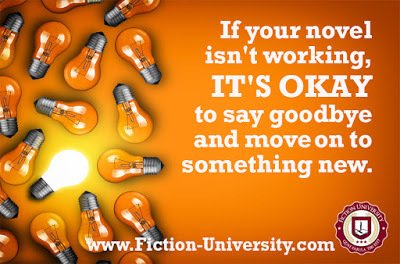
4. Why does it have to be this novel?
If an idea keeps drawing you back, there's a reason. What about this project makes you want to write it, even though it's frustrating you and feels like it's never going to work? Why do you love it? What do you need to do to write it?
For me, Idea #1 was the first idea I got excited about after I'd sold my trilogy (and my new editor loved the concept), so I felt like I owed it to myself to write it. I loved the setting, the themes, the characters. Idea #2 explored an idea and world I found fascinating, with characters I really wanted to get to know better. Idea #3 had an idea that tickled me to no end, and allowed me to try something new.
(Here's more on 5 Reasons to Give Up on Your Novel (And One Reason Not to))
Now ask yourself, "Do I really want to finish this novel?"
This is a hard question to ask, because often we've put so much work into a novel that setting it aside feels like we failed.
But not every story works and not every idea needs to be written. If an idea isn't ready, or never will be ready, that doesn't mean we're bad writers.
If the answer is yes: Finish that novel. Figure out what you need to do to make it work, and go after it. Don't be afraid to make deep cuts, change characters, re-do the plot, or even start fresh with nothing but the idea. The idea is what keeps drawing you back, so that's all that really matters. Everything else can be changed to best fit that idea (even if that idea is a character you can’t let go of).
If the answer is no: Bid that project farewell and move on to a new idea. Don't feel guilty about all the work you put into it, or think you have to finish every manuscript you start. It was a good learning experience, and no writing is ever wasted. What you did with that manuscript will make the next one that much easier to write, and you'll be a whole lot happier.
(Here’s more on Getting Your Novel to the Finish Line: Resisting the Shiny New Idea (Part Three))
What I decided from this exercise:
Idea #1 was a hesitant no with a side of maybe. I thought I could fix it one day, maybe in a year or two, after I'd had a good run of writing and I was no longer worried about losing my muse again. If I went back to it, I'd likely spend the next year struggling with it and feeling miserable.
I did go back to this manuscript and start over a few years ago. I gave it six months, wrote a very rough draft—and it still didn’t work. -sigh- Some books are just like that. And one day, I’m going to try again. This is an idea I just can not give up on no matter how many times it’s knocked me to the mat.
Idea #2 was a solid yes, but after I wrote the projects I was more excited about. I thought it would be a good book to return to later, maybe a NaNo novel—knock out the first draft for fun and see what happened. If it worked, I'd revise, but if not, I'd move on.
Idea #3 was the strongest and had the most promise, and more importantly—it was fun to work on. I finished this novel and indie published it since it was outside my normal market. It's the first book in my Grace Harper urban fantasy series, Blood Ties.
The sheer time, energy, and dedication it takes to write a novel means it's hard to walk away from it when we need to.
Like a bad relationship, it's easier to stay one more day with what's known than to quit and venture into the unknown. But if a fresh start is the right thing to do, we need to be able to look at our writing objectively and judge the best course for our career and our sanity.
If your novel isn't working, it's okay to say goodbye and move on to something new. Just as it's okay to stay with a novel you love if you honestly think you can make it work.
Trust your instincts, consider all your options, and do what's best for you as a writer.
EXERCISE FOR YOU: Take a few days and analyze your manuscript. Answer the above questions and decide if this is a manuscript you want to stick with, or let go. Be honest with what you need as a writer at this time.
Are you wondering if you should give up on a novel? What's stopping you?
Need help revising? Get all three Fixing Your Revision Problems books in one omnibus!
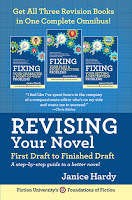 This book contains Fixing Your Character & Point-of-View Problems, Fixing Your Plot & Story Structure Problems, and Fixing Your Setting & Description Problems--PLUS a BONUS workshop: How to Salvage Half-Finished Manuscripts.
This book contains Fixing Your Character & Point-of-View Problems, Fixing Your Plot & Story Structure Problems, and Fixing Your Setting & Description Problems--PLUS a BONUS workshop: How to Salvage Half-Finished Manuscripts. A strong story has many parts, and when one breaks down, the whole book can fail. Make sure your story is the best it can be to keep your readers hooked.
With clear and easy-to-understand examples, Revising Your Novel: First Draft to Finished Draft Omnibus offers eleven self-guided workshops that target the common issues that make readers stop reading. It will help you:
Flesh out weak characters and build strong character arcsFind the right amount of backstory to enhance, not bog down, your storyCreate unpredictable plots that keep readers guessingDevelop compelling hooks to build tension in every sceneDetermine the right way to include information without infodumpingFix awkward stage direction and unclear character actions Revising Your Novel: First Draft to Finished Draft Omnibus starts every workshop with an analysis and offers multiple revision options in each area. You choose the options that best fit your writing process. This easy-to-follow guide will help you revise your manuscript and craft a strong finished draft that will keep readers hooked.
Available in paperback and ebook formats.
 Janice Hardy is the award-winning author of the teen fantasy trilogy The Healing Wars, including The Shifter, Blue Fire, and Darkfall from Balzer+Bray/Harper Collins. The Shifter, was chosen for the 2014 list of "Ten Books All Young Georgians Should Read" from the Georgia Center for the Book.
Janice Hardy is the award-winning author of the teen fantasy trilogy The Healing Wars, including The Shifter, Blue Fire, and Darkfall from Balzer+Bray/Harper Collins. The Shifter, was chosen for the 2014 list of "Ten Books All Young Georgians Should Read" from the Georgia Center for the Book. She also writes the Grace Harper urban fantasy series for adults under the name, J.T. Hardy.
When she's not writing novels, she's teaching other writers how to improve their craft. She's the founder of Fiction University and has written multiple books on writing.Website | Facebook | Twitter | Pinterest | Goodreads | Amazon | Barnes & Noble | iTunes | Indie Bound
February 25, 2022
Short Book Reviews: A Physician-Sorcerer Takes on an Epidemic
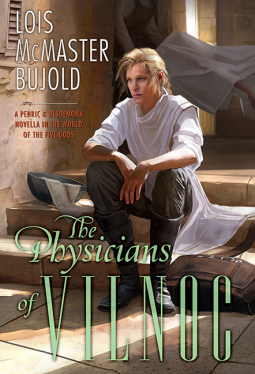
The Physicians of Vilnoc, by Lois McMaster Bujold (Subterranean)
This latest novella featuring temple sorcerer and sometimes healer, Penric, and his chaos demon, Desdemona, is a love letter to epidemiologists. In a time of plague, tracing the course of the outbreak is the key to gaining control. Is it contagious? What is the means of spread? How did it enter the community? Who dies, and who survives—and why? In this tale, Penric is summoned to an army fort town where a mysterious illness is rapidly spreading, threatening the ability of the soldiers there to defend the port capital. Through Desdemona, Penric can manipulate chaos, thereby allowing a patient’s body to heal itself, but the cost can be high and the limitations on what one sorcerer can do, are great. Through Desdemona, he can siphon off chaos from a patient’s body, in essence lowering the entropy and increasing the orderliness of the tissues. But the amount of chaos remains the same, and Desdemona can absorb only so much. The best way to discharge it is through the ultimate increase in entropy, the death of a living creature. This poses a moral dilemma for Penric, for although ridding the place of fleas and rats is not a problem, their tiny lives are not sufficient. He sets up an arrangement with the butcher to slaughter food animals quickly and painlessly, but even that cannot keep up with the increasing accumulation of chaos.
Over her long existence, Desdemona has passed through a series of hosts, not all of them human, and she carries their memories and wisdom. Her relationship with Penric is exceptional because he treats her as a partner and not as a dangerous, rebellious slave to be controlled at every step. As a consequence, or perhaps as a result of the variety of hosts she’s known, Desdemona has slowly acquired the ability to trust and be trusted. She’s still a demon, but she’s one that values her host and his concerns.
Besides his partnership with Desdemona, Penric also has an inquiring mind and keen analytic skills, with the ability to see through the easy, superficial explanations. He knows that knowledge of how the disease is spread and where it came from is crucial to containing it, but he’s being run ragged in trying to save lives. He’s in dire need of help, but in even more desperate need of information.
I loved all the previous “Penric” stories, but this one was particularly resonant, given that we are now entering our third year of the Covid-19 pandemic. The Physicians of Vilnoc is a poignant and compelling reminder of our vulnerability to contagious diseases, and the importance—the necessity—of meticulous epidemiology in combatting them.
February 24, 2022
Repost from The Conversation: Ukraine conflict brings cybersecurity risks to US homes, businesses
Ukraine conflict brings cybersecurity risks to US homes, businesses
 Regular Americans could find themselves targets of Russian cyberwarfare. Roberto Westbrook via Getty Images Richard Forno,
University of Maryland, Baltimore County
Regular Americans could find themselves targets of Russian cyberwarfare. Roberto Westbrook via Getty Images Richard Forno,
University of Maryland, Baltimore County
All cybersecurity is local, regardless of the world situation. That means it’s personal, too – in Americans’ homes, computers and online accounts. As violence spreads thousands of miles away from the U.S., my strong recommendation is that all Americans remain vigilant and check on their own cybersecurity.
While organizations reinforce their cybersecurity posture during this period of geopolitical tension, I also suggest people regularly ensure their computer, mobile devices and software are updated, double-check that all passwords are secure and all key accounts are protected by two-factor authentication. Beware that phishing attacks may increase, seeking to trick people into clicking links that grant attackers access to computer systems. These are a few simple steps that can help increase one’s cybersecurity preparedness both now and for the future.
Recent Russian-linked cyberattacks, including against energy pipelines, federal government services, and attacks on local governments, first responders, hospitals and private corporations, show the potential for Russian cyber warriors to put U.S. civilians at risk. All these entities should be more vigilant over the coming days.
In the days before Russia invaded Ukraine, a series of cyberattacks disrupted Ukrainian government and business websites – despite Ukraine’s cyberdefense teams’ being prepared to defend against them.
With many Americans working from home because of the pandemic, the U.S. is more vulnerable than it might have been otherwise: Home networks and computers are often less protected than those at an office – which makes them enticing targets.
Russian cyber capabilities, and threats from Russian President Vladimir Putin, mean that what might look like random technical glitches on personal computers, websites and home networks may not be accidental. They could be precursors to – or actual parts of – a larger cyberattack. Therefore, ongoing vigilance is more crucial than ever.
[Like what you’ve read? Want more? Sign up for The Conversation’s daily newsletter.]
Richard Forno, Principal Lecturer, Cybersecurity and Assistant Director, UMBC Cybersecurity Center, University of Maryland, Baltimore County
This article is republished from The Conversation under a Creative Commons license. Read the original article.
February 18, 2022
Short Book Reviews: Hallucinatory Noir, With Cockroach
Within Without (A Nyquist Mystery), by Jeff Noon (Angry Robot)
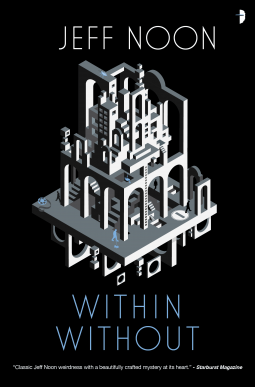
This is the third “John Nyquist Mystery” I’ve read and it’s by far the weirdest. Nyquist’s latest case involves the theft of a sentient, essence-of-glamor image that has gone missing from its host. To investigate, Nyquist and his new assistant travel to the city of Delirium, guarded by boundaries that are far more than checkpoints or physical barriers. Their search for the magic practitioner who created and attached the image to begin with leads them into increasingly bizarre cities-within-cities. In Escher, Nyquist discovers his “Inverse,” the character hidden within his psyche, and it turns out to be Gregor Samsa, the narrator of Kafka’s Metamorphosis, who wakens one morning to discover he has turned into a cockroach. So Nyquist must deal not only with Samsa’s personality and voice, but that of the cockroach. As if that weren’t strange enough, his assistant has become infected with a creeping magical substance and, obsessed with taking the image, named Oberon, for his own, disappears. Plot twists abound, building until Nyquist finds himself in an utterly different plane of existence, one in which the images define and distort reality. The book carries forward and intensifies the hallucinatory texture of the previous Nyquist novels.
February 14, 2022
Praise for JAYDIUM
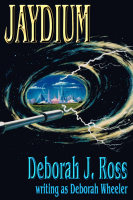
Jaydium, my debut science fiction novel from back in 1993, was included in a recent StoryBundle. I was pleased to have my book selected but then thought no more about it. Then I saw this review from 2020 by Jemima Pett:
Jaydium starts off on a deadbeat planet with miners slouched around causing havoc in a bar. It sounded terribly familiar. The girl is different, but the arrival of her ex-partner, and his new partner, and his friend, seems to send it off on a trite space romance. This gets worse when the friend insists on helping the girl out by flying duo with her to help her cut some jaydium. Jaydium is much like orichalcum is in my universe, but it enable faster-than-light travel, rather than instantaneous communications. It’s still highly prized and only found in a few places.
At that point I was thinking… meh.
Then it all changed. And then it changed again! I wondered how many changes we were in for, but the development of the later change and the attention to possibilities both sociological and temporal had me completely hooked.
Ms Wheeler writes a mean story, with great action sequences, and she keeps the action going. The relationships develop at a sensible and realistic pace, especially when dealing with four beings out of time with each other. The need for a double helping of translation tech was a nice touch. I would quibble over a few things that needed editing, and I sometimes felt the switched of point of view were confusing. like the author couldn’t quite decide who she’d rather have tell this part of the tale.
There is potential for further adventures of the pair we are left with departing together on a spaceship at the end, but really, I think it would be hard to develop their characters from there. But more convoluted space adventures from Ms Wheeler, please!
JAYDIUM 'Ms Wheeler writes a mean spacetime story, with great action sequences' #jaydium #scifi #spacetimereads @storybundleCLICK TO TWEETShare this:



